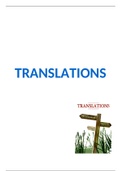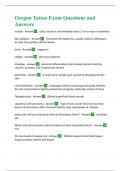Study guide
Full analysis, themes of Translations Play
- Course
- Institution
- Book
In-depth analysis of themes and all scenes of the play including analysis of quotes. The 65-page booklet includes context as well which is essential to integrate throughout essays. Character analysis is also included. An essential guide to understanding the play.
[Show more]





